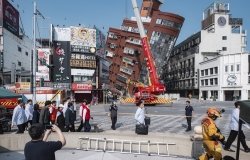Securing Peace in Mindanao: Resolving the Roots of Conflict
Richard Solomon, President, United States Institute of Peace and former Assistant Secretary of State for East Asian and Pacific Affairs and Ambassador to the Philippines; Carolyn Arguillas, Chairperson, Mindanao News and Information Cooperative Center; Abhoud Syed M. Lingga, Chairman, Bangsamoro People's Consultative Assembly; Michael Mastura, President, Sultan Kudarat Islamic Academy Foundation; Steven Muncy, Executive Director, Community and Family Services International
Overview
Co-Sponsored with the Asia Society and the U.S. Institute of Peace
Richard Solomon, President of the U.S. Institute of Peace and former Assistant Secretary of State for East Asian and Pacific Affairs, and Ambassador to the Philippines; Eugene Martin, Executive Director, Philippine Facilitation Project, USIP; Michael Mastura, President, Sultan Kudarat Islamic Academy Foundation; Abhoud Syed M. Lingga, Chairman, Bangsamoro People's Consultative Assembly; Carolyn Arguillas, Chairperson, Mindanao News and Information Cooperative Center; and Steven Muncy, Executive Director, Community and Family Services International.
This September 28 symposium, co-sponsored by the Asia Society and the United States Institute of Peace, explored the sources of the conflict between the Government of the Republic of the Philippines (GRP) and the Moro Islamic Liberation Front (MILF).
Richard Solomon gave a broad overview of the conflict and the U.S. Institute of Peace's efforts to facilitate negotiations between the GRP and MILF. He emphasized that efforts to resolve the conflict should address underlying causes and not just rely on a military solution. Solomon also stressed the importance of maintaining the territorial integrity of the Philippine archipelago. Eugene Martin, who heads the USIP's facilitation efforts, moderated the discussion.
Michael Mastura traced the origins of the conflict to the arrival of the Americans in 1898 and the creation of a Moro province that did not have the interests of the Bangsamoro people in mind. Mastura described the MILF's strategy in resolving the conflict as both incremental and multilateral, emphasizing that the goal was not only the acquisition of power, but also addressing the many problems afflicting the Bangsamoro people. He noted the Malaysian government's critical role in mediating the conflict while also expressing distrust of U.S. motives in the peace process.
According to Steven Muncy, 4 social groups are playing a significant role in ameliorating the conflict: internally displaced people, NGOs, women, and the communities impacted by the fighting. He made 4 recommendations for policymakers in the United States: 1) strongly encourage the GRP and MILF to make peace; 2) coordinate closely with NGOs and donors; 3) make grassroots community-driven initiatives a priority; 4) make efforts to inform the U.S. public, especially the Filipino diaspora community.
Abhoud Syed Lingga argued that the roots of the conflict between the Bangsamoro people and the GRP lie in persistent underdevelopment. He stated that the struggle did not begin as an armed rebellion, but a peaceful movement that eventually turned into a liberation movement out of self-defense. He especially noted the belligerency of both the Estrada and Arroyo governments. While the Tripoli agreement of 2001 provides a basis for peace, Lingga believes that exploring new formulas is essential for a lasting reolution.
Journalist Carolyn Arguillas talked broadly about the history of the conflict and also focused on the role of the media. Departing from the communal arguments of the other speakers, Arguillas suggested that competition over Mindanao's rich mineral resources was a major contributing factor in the conflict. Finally, she asked pointedly, "What is the U.S. interest in the conflict? War or Peace?" While the signals sent by the United States may be ambiguous, Arguillas relayed an unequivocal message from many people in Mindanao she had spoken to before this symposium—that the U.S. should not be involved in the peace process and should pull out its troops.
Hosted By

Indo-Pacific Program
The Indo-Pacific Program promotes policy debate and intellectual discussions on US interests in the Asia-Pacific as well as political, economic, security, and social issues relating to the world’s most populous and economically dynamic region. Read more
Thank you for your interest in this event. Please send any feedback or questions to our Events staff.










